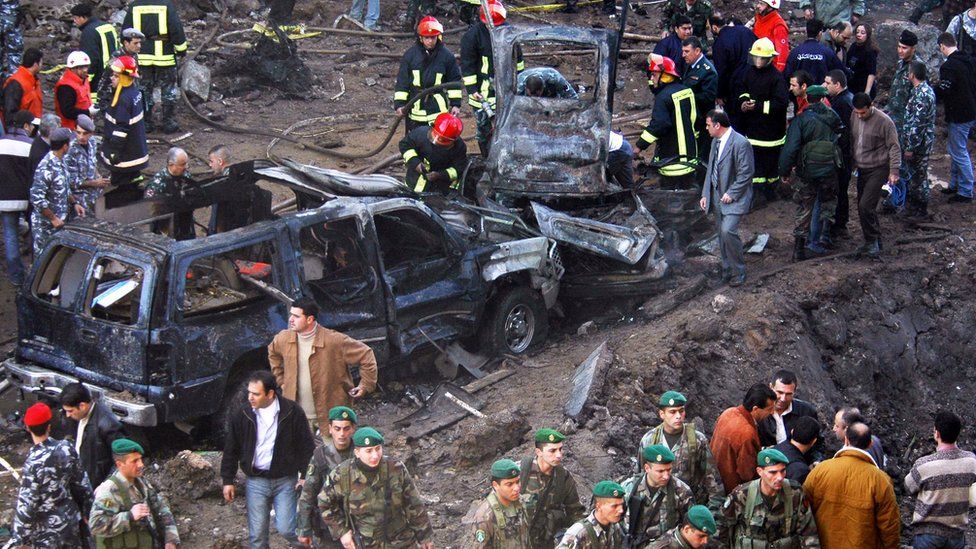Rafik Hariri tribunal: Guilty verdict over assassination of Lebanon ex-PM
- Published

The blast near Beirut's seafront killed Hariri and 21 other people
A UN-backed court has found a member of the militant group Hezbollah guilty of involvement in the assassination of former Lebanese PM Rafik Hariri.
Judges at the Netherlands-based Special Tribunal for Lebanon said Salim Ayyash had a central role in the bomb attack in Beirut in 2005 that killed Hariri.
They acquitted three other defendants, who like Ayyash were tried in absentia.
Hezbollah denied any involvement, and the judges said no evidence implicated the Shia militant group's leaders.
Hariri's son Saad, who is himself a former prime minister, told reporters outside the court: "I think today everybody's expectation was much higher than what came out, but I believe the tribunal came out with a verdict that is satisfying and we accept it."
Rafik Hariri's son Saad said the family would "not rest until the punishment is carried out"
Now, he said, it was time for Hezbollah to "make sacrifices".
"It is clear that the network responsible is from its ranks," he added. "We will not rest until the punishment is carried out."
The verdict comes at a time of crisis in Lebanon, with the country still reeling from a devastating explosion at Beirut's port two weeks ago that killed at least 180 people.
The blast led to the resignation of the government, already embattled by protests over an economic collapse that has seen many people lose their savings and jobs.
The tribunal's verdicts will disappoint supporters of Rafik Hariri as well the families of the 21 others who were killed and the 226 who were wounded, many grievously.
The man convicted in his absence, Salim Ayyash, was a well-connected, mid-level operative in Hezbollah, the most powerful military and political group in Lebanon. It is classified by the UK, the US and others as a terrorist organisation.
Hezbollah's leader, Hasan Nasrallah, has denied it was involved and refused to allow the arrest of Ayyash or the other men who have been cleared. One of his top military commanders, Mustafa Badreddine, was also indicted until he was killed in Syria in 2016.
The verdict has nevertheless given Rafik Hariri's son Saad, a former prime minister who might get the job again, a lever to use against Hezbollah.
The Hariri camp, and others, believe Ayyash was acting under orders, from Hassan Nasrallah and most likely from Hezbollah's backers, Syria and Iran. Rafik Hariri was seen as a threat to their power in Lebanon.
One of the judges, David Re, said the court had found motive but not evidence.
Even so, the conviction of a Hezbollah man will feed into the fevered political atmosphere in Lebanon.
What's the case about?
Rafik Hariri, a Sunni, was a billionaire businessman who served as prime minister of Lebanon five times following the 1975-90 civil war.
His last term in office ended in 2004, after which he aligned himself with the opposition in parliament and backed calls for Syria to withdraw its forces, which had been in Lebanon since 1976.
Hariri, a billionaire businessman, had urged Syria to leave Lebanon
On the morning of 14 February 2005, Hariri was travelling in a motorcade past the St George Hotel in downtown Beirut when a bomb hidden in a van exploded.
The blast created a crater at least 10m (32ft) wide and 2m deep in the street, and left nearby vehicles smouldering and shopfronts blown out and blackened.
The killing brought tens of thousands of demonstrators onto the streets in protest against the pro-Syrian government, with the finger of blame for the assassination pointed at Lebanon's heavily influential neighbour.
The government resigned two weeks later and Syrian troops pulled out that April.
The killing of Hariri triggered huge anti-government protests in Beirut
After collecting evidence, the UN and Lebanon set up the STL in 2007 to investigate the bombing, and four suspects were ultimately put on trial in absentia.
The prosecution's case relied on the analysis of calls between mobile phones that it said were used to plan, prepare and execute the attack.
A Lebanese investigator who started the trawl of the phone data and made crucial early breakthroughs, Wissam Eid, was assassinated in Beirut in 2008.
What did the judges say?
They found Ayyash, 56, guilty of five charges, including conspiracy aimed at committing a terrorist act, committing a terrorist act by means of an explosive device, and the intentional murder of Hariri with premeditation by using explosive materials.
The whereabouts of Salim Ayyash remains unknown
STL prosecutors alleged that Ayyash co-ordinated the physical perpetration of the attack and, together with Mustafa Badreddine, the surveillance of Hariri.
Ayyash was also accused of purchasing the van that exploded, and of having played a role in preparing what prosecutors said was a false claim of responsibility made by a Palestinian man on behalf of a fictional Sunni fundamentalist group.
Ayyash's court-appointed defence lawyers said the prosecution's case relied on circumstantial evidence that did not prove his involvement in the conspiracy.
But Judge David Re told the court on Tuesday: "Mr Ayyash had a central role in the execution of the attack and directly contributed to it.
Hezbollah chief Hassan Nasrallah rejected the trial as a plot
"Mr Ayyash intended to kill Mr Hariri and had the required knowledge about the circumstances of the assassination mission, including that explosives were the means to be used."
The judge said there was not enough evidence to prove beyond reasonable doubt the guilt of the other defendants - Assad Sabra, 43, Hussein Oneissi, 46, and Hassan Habib Merhi, 54.
The panel also concluded that while Syria and Hezbollah "may have had motives to eliminate" Hariri and some of his political allies, there was "no evidence that the Hezbollah leadership had any involvement in Hariri's murder and there is no direct evidence of Syrian involvement", according to Judge Re.
- Published16 January 2014
- Published18 August 2020
- Published14 May 2016